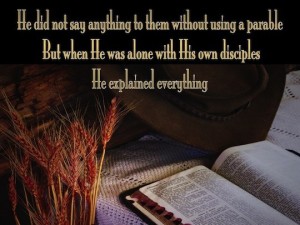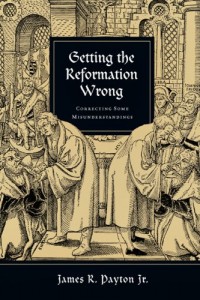Factionists, Solo Scripturists and the Bible
Author: Bobby Valentine | Filed under: Bible, Exegesis, Faith, Hermeneutics, Ministry, Patternism, Preaching, Sectarianism, Unity It is dangerous to pass judgement upon a person’s motives. Extremely dangerous. Especially when you do not have a personal history with a person. But some people are egocentric. Some people do try to manipulate people, I have seen it and been the victim of it.
It is dangerous to pass judgement upon a person’s motives. Extremely dangerous. Especially when you do not have a personal history with a person. But some people are egocentric. Some people do try to manipulate people, I have seen it and been the victim of it.
In texts like Jude, 2 Peter 2, and 1-2 Timothy, we find taxonomies describing false teachers. (See my blog A Taxonomy of Sectarianism) Yes false teachers do exist! Biblically, false teachers are rarely false simply because of what they teach. There are those that are. A person that denies the existence of God, the bodily resurrection, that we can be saved by anything but the grace of God. These are false teachers.
But the taxonomies of false teachers in the New Testament focus on the nature of the individual, they are self-centered, ego driven, lovers of money, harsh … and factionists. We all need to examine ourselves to see if we are thirsting for our name in neon lights or to have people notice us. We need to guard our heart because such a person is (to quote Jude) a “blemish at your love feast.” Yet it is dangerous to one’s soul to judge motives but we need to be regularly judging our own. Practice a hermeneutic of suspicion only upon yourself … unless you claim the gift of prophetic insight.
False teachers are often rabid solo scripturists though. They are in fact abusers of the doctrine of the perspicuity of Scripture. In historic Christianity the doctrine of the “clarity” of Scripture pertains to matters necessary to salvation. But the doctrine is grossly perverted when married to modernistic ideas of individualism and cutting ourselves off from insight from anything other than our own intuition. False teachers are almost always against scholarly helps in understanding any portion of the Bible except their own approved explanation.
The arrogance of self-sufficient individualism is the enemy of all faithful Bible reading. It is not a slight on the power of God to admit we may have to do a little homework to understand everything in 1 Timothy just as a person living in Ephesus in the AD 60’s some two thousand years ago.
Sola Scriptura vs Solo Scriptura
Many American restorationists confuse the notion of sola scriptura with the idolatrous SOLO scriptura. Let me unpack this statement briefly.
We are saved by Christ, not the Bible. The Gospel is not the Bible. The Bible bears witness to the message of the Christ who saves but there is much in the Bible that is NOT Gospel. Thus while classic restorationists like Thomas Campbell, Alexander Campbell, Barton Stone, Robert Richardson all affirmed the clarity of the Gospel they made equally clear a distinction between the Gospel and the Bible. So while every one can agree on the Gospel there is the possibility that men of great ability will reach different conclusions on very important things.
Thomas Campbell disagreed with Barton Stone on one of the most important teachings of the Bible – the atonement. But not only the atonement but the nature of Christian ministry. But not only that the role of and nature of the Holy Spirit. But not only that how often one had to take the Lord’s Supper. But not only that … just what should followers of Jesus call themselves. These disagreements were not about the Gospel but about interpretation of Scripture.
Yet Scripture is “clear” and both affirmed that all anyone needed was the Bible, interpreted with appropriate helps, in order to become a follower of the Lamb. They affirmed sola scriptura not solo scriptura. Yet BOTH were able to remain in fellowship though disagreeing powerfully on these and many other matters. The Bible was clear about the Lamb in ways it was not about the issues disagreed upon.
Gospel and Bible are Not the Same
Why? Why were Thomas and Barton able to remain in full fellowship? It was not because they imposed their point of view on the other. It was precisely because they recognized the INTEGRITY of the other and the FREEDOM to study, with the best resources available, and come to a conclusion different than themselves. And because – unlike so many today – they did in fact make a distinction between the clarity of the message of the Gospel and the Bible itself. Thus as Robert Richardson, when summarizing the foundational principles of the Stone Campbell Movement made this point crystal clear:
“Men seem to have lost sight of the obvious distinction which is to be made between the Bible and the Gospel. As the Bible contains the gospel, and its ancient records are important in elucidating and confirming it, they have become so intimately associated in the mind of the religious public that they have lost sight of the just distinction between them …
“It should never be forgotten that the Apostles and the first preachers of the Gospel had no Bibles, and not even a New Testament, to distribute; and there was no such thing among early christians as a formal union upon the ‘Bible alone.’ Nay, rather, it was a union upon the GOSPEL ALONE {sic}; for in those days the gospel possessed an identity, and enjoyed a distinct and determinate character …
“Let the “Bible alone” then be our exhaustless treasury of religious knowledge, and to its sacred pages let us continually resort, that we may be enriched from its accumulated stores of divine truth. Let the Bible be our spiritual library; but let the Gospel be our standard of orthodoxy … In a word let the Bible be to us the thing it was DESIGNED TO BE {my emphasis} by its Author, but let ‘Christ crucified’ be not only our peace with God, but our peace with one another.” (Robert Richardson, Reformation IV [Millennial Harbinger September 1847], pp. 508-509)
This, my beloved reader, is how Thomas Campbell and Barton Stone, though arguing powerfully in the pages of the MH over something as important as the blood of Jesus and what it did and does and disagreed on virtually everything about it except that it saves, … could be One!
 Scripture Does Not Claim it is always Clear
Scripture Does Not Claim it is always Clear
All doctrine is to be based upon the Scripture itself rather than formulated philosophically and then imposed upon the Bible. This is true of even the doctrine of the perspicuity of Scripture. Many factionists rather conveniently ignore the rather ironically plain declarations in Scripture to its often difficult nature. In fact, Scripture does not, to my knowledge, anywhere state that Scripture was always intended to be clear. Where is that scripture. I know this is practical heresy for some but lets get to the text and ask what does the text say.
Jesus claimed he spoke in parables precisely for the opposite reason (Mt 13.10-17). Some see and never see. Some hear and never hear … the whole of Matthew 13 is on this. Psalm 119 is filled with prayers to God to “open my eyes” (v.18) and to “teach me so I may understand” … clearly the Psalmist did not believe in SOLO sciptura.
When the Eunuch, a highly intelligent official from Meroe, was reading the the Bible he was asked a simple question, “do you UNDERSTAND what you are reading?” (Acts 8.30). According to some modern solo scripturaists the proper answer should have been,
“why yes … either you are self deceived or stupid because the word is so clear only those who do not want to understand do not understand!”
That is how some imagine it should go down. And I point out that this was over something that led to SALVATION. But Luke, by the Holy Spirit’s guidance, did not write as Solo’s imagine. He records the response as “How can I, unless someone EXPLAINS it to me” (Acts 8.31).
The NT places great emphasis on the necessity of teachers who have been trained themselves. Part of Timothy’s job was to TRAIN and PASS on not simply information but the proper way of understanding it. The NT uses the word “tradition” repeatedly for this. Paul for all his independence (I think liberal Protestants have over emphasized this independence) when it came to the core of the Gospel whipped out the tradition, “for what I RECEIVED I PASSED ON to you.” (I discuss the biblical material on the necessity of teachers in my blog Is there a Place for Preachers? Teachers? or worse, Scholars? In the Kingdom of God)
The apostle Peter warns of those who do not respect Scripture. Perhaps it was partly the mark of the factionist, the false teacher, that insisted Scripture was easy and plain but twisted those places that should in fact recognized for what they are, difficult.
“And count the patience of our Lord as salvation, just as our beloved brother Paul also wrote to you according to the wisdom given him, as he does in all his letters when he speaks in them of these matters. There are some things in them that are hard to understand, which the ignorant and unstable twist to their own destruction, as they do the other Scriptures. (2 Pet 3:15–16)
These words by Peter are not directed to Jude. They are not in response to portions of Daniel or Ezekiel. They are not even in regard to the book of Revelation. They are directed toward the epistles of Paul! We do not know how many letters Peter had read but we do know which ones we have. Why do we dogmatize when even an inspired apostle can say they “are hard?” Romans? Corinthians? Thessalonians? even Philemon! I can think of things that are incredibly challenging and difficult. The “unstable” Peter warns us insist otherwise. Factionists insist otherwise.
Everything is not easy to understand beloved. We need to affirm sola scriptura but we need to flee from the idol of solo scriptura. Sola scriptura does not mean, and never has meant, that the Bible is the only thing an individual ever reads or needs to understand all of the Bible. There is not even one magisterial Reformer that held such a position, nor was it affirmed in any way by the leading lights of the Stone-Campbell Reformation. As the good sola scriputurist James A. Harding once declared, “Scripture does not teach that the Bible alone thoroughly furnishes the man of God for every good wok, but the Bible IN ADDITION to what had already been given does so” (my emphasis). The Bible is not the only Spiritual gift given to the family. The same Spirit that gave the Bible has given us the Spirit filled community, equipped teachers, given us worship and many other wonderful treasures that we rejoice in. The Bible has not an iota of individualism within it rather it is a communal document from its creation, preservation, and presentation.
We need to confess what is patently true of the first century Way, the Bible and the Gospel are not and never will be the same thing. We hold, in the words of Richardson, the Bible to be our “spiritual library” for exploration that can never be complete. But the Gospel is the standard for orthodoxy in all places in the apostolic writings.

American Evangelicals have distorted numerous themes from the Reformation. Among those are sola fide and sola scriptura. Payton offers a masterly and engaging corrective.
Hold the Arrows
Do not misunderstand me. I can see the arrows flying now. There is a great deal of the Bible that reads well and easily. We can understand narrative and the Bible itself has summaries all along the way to show us the important matters (like chapter summaries in modern books). Indeed the more we read the Bible as a whole the more the Bible as a whole makes sense. But it is still true even in narratives that are 2000 to 2500+ years old there are matters that we simply do not see without help. Lets read and reread and reread the Bible again. Do so in worship. Ask questions. Seek input. Seek God.
But we can know Jesus, have a relationship with him and follow him. The Restoration movement affirmed that Christians already agreed on the “essentials” of the faith … please note the “already.” Calvinists and Arminians already agreed on the essentials. Campbell said this repeatedly. This was the distinction between the Gospel and the inexhaustible library (Richardson’s apt metaphor). It is is true. We do agree on the essentials.
Conclusion
The Gospel is clear. Scripture sometimes is clear and sometimes Scripture is just simply difficult. It is a lie to claim otherwise. And there are indeed people who agree on the Gospel and are indeed brothers in Christ, and are indeed in fellowship with the Lord together who disagree strongly on various passages of the Bible.
I have learned that it is not the difficulties of the text that cause us problems but the quite clear and plain teachings: Accept one another as Christ has accepted you; If your brother has something against you leave your gift at the altar, go and be reconciled to your brother and then offer your gift; Do not forbid speaking in tongues; etc.
The Sectarian and factionist looses the distinction between Gospel and Bible and seeks to impose a creed like position on a passage as a test of fellowship rather than the Gospel that made us one. Lets learn from the example of Barton Stone and Thomas Campbell to study deeply to show ourselves approved, share what we understand, do so with love and humility … and recognize the profound difference between my understanding of the Bible and the Gospel of Jesus Christ.
Be blessed.
March 18th, 2016 at 2:59 pm
Bobby – as always I enjoyed this article. Thanks for writing it!
March 18th, 2016 at 8:19 pm
thank you Don. I am humbled that you read my musings.
July 25th, 2022 at 8:25 am
I know this is an old post, but it was much needed for me. I’ve read and been encouraged by your blog and books for a long time and came across this while wandering around the archives today. Those unity roots of the restoration movement are so important and beautiful. After spending the first 32 years of my life in Churches of Christ, I’ve been worshipping with a non-denominational but reformed leaning Church for the past year. I’ve been so blessed by this congregation, but I’m sometimes still bothered by some of the theological leanings that I still hold in opposition to many of my brothers and sisters there. And yet, I don’t want those to cut off our fellowship with one another. This line: “Calvinists and Arminians already agreed on the essentials.” was one I’ve needed to hear for the past few months. Our mission is the same, we’re empowered by the same Spirit. Thanks for the encouragement and scholarship in these subjects. You’ve been a blessing to me and my family!